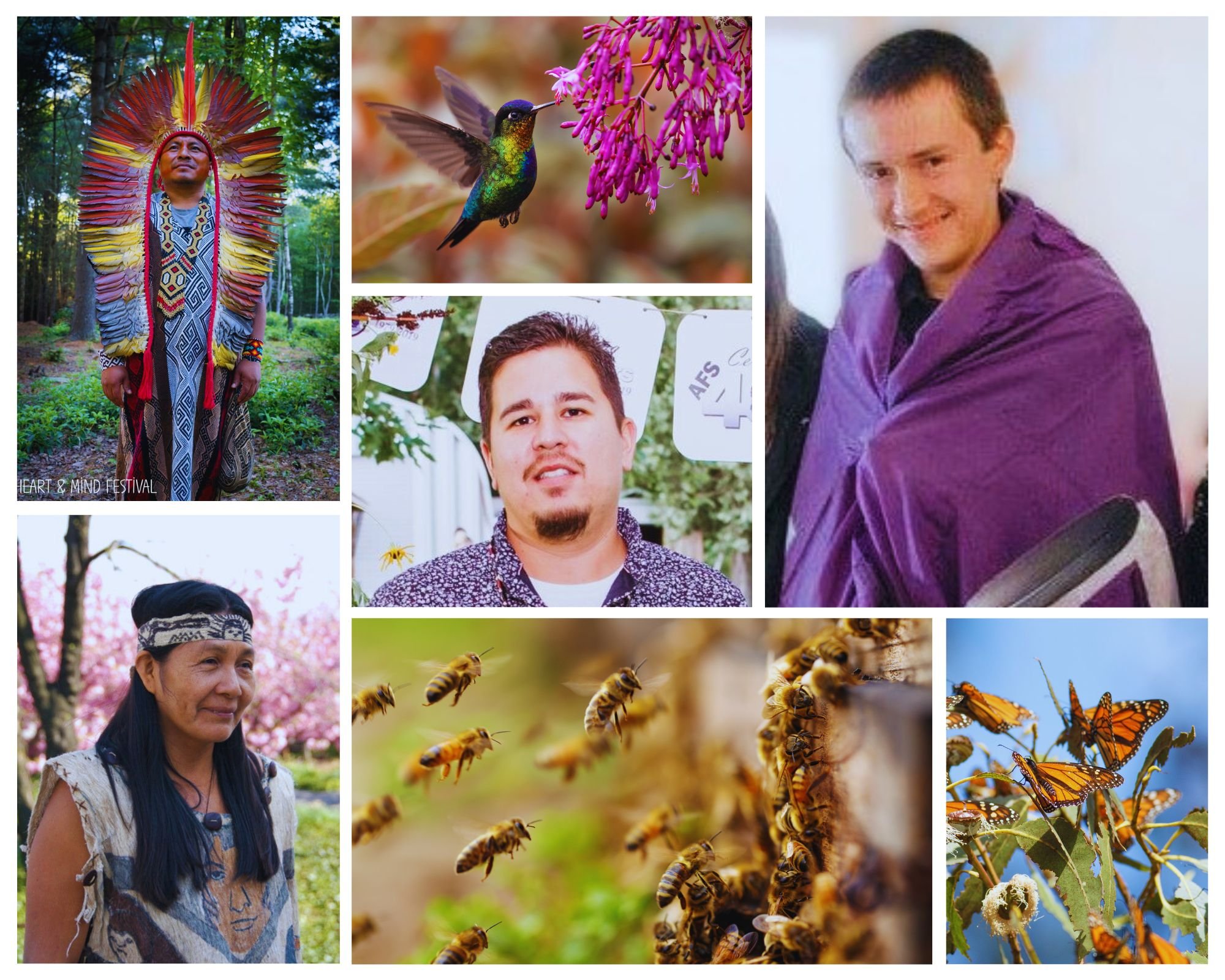Research shows that Indigenous people preserve 80% of the world’s biodiversity and are responsible for 70%-80% of the world’s food production. The only beings on this planet that supersede this level of ecological responsibility for the production of food and protection of biodiversity are the Pollinators. As is the case in many indigenous nations, pollinator habitats are shrinking and threatened by industrial expansion resulting in subsequent biodiversity loss. While it can be plainly stated that indigenous people and pollinators have the most important job on this planet, most of us remain completely unaware of the vital role they play in protecting and perpetuating all of life. It stands to reason that we have much to learn, absorb, integrate and practice within the realm of pollination and traditional wisdom.
Join us on Saturday, April 26th from 9:30am-12:30pm for a Round Table conversation amongst leaders from indigenous nations from the north and south, as they cross pollinate knowledge ways and share wisdom on Pollination through their traditional cosmology. This event is in collaboration with Root to Heaven's New Initiative, Pollinate NYC.
Featuring:
Yube Huni Kuin - Huni Kuin, Brazil
Abuela Gloria Ushigua - Zapara, Ecuador
Waylon Cook & Levi Herne - Mohawk, New York
Nana Marina Cruz - Tzu’tujil Mayan, Guatemala
Rosa - Atacameño, Chile
Yube Huni Kuin is from the Huni Kuin people of Acre, Brazil. He is an Indigenous Agroflorestal Agent and Award Winning Indigenous filmmaker. He was Secretary of AMAAIAC (Association Movement of Indigenous Agroforestry Agents of Acre) from 2002 to 2008 and Advisor for Indigenous Affairs with the Government of the State of Acre from 2011 until 2019. He is currently the Vice President of 108 Villages, husband, father to 10 children, grandfather and popularly nicknamed the Buddha of the Forest. is from the Huni Kuin people of Acre, Brazil. He is an Indigenous Agroflorestal Agent and Award Winning Indigenous filmmaker. He was Secretary of AMAAIAC (Association Movement of Indigenous Agroforestry Agents of Acre) from 2002 to 2008 and Advisor for Indigenous Affairs with the Government of the State of Acre from 2011 until 2019. He is currently the Vice President of 108 Villages, husband, father to 12 children, grandfather and popularly nicknamed the Buddha of the Forest.
Gloria Ushigua is President of the Sápara women's organisation Ashiñwaka, which defends Sápara people's ancestral land and environmental rights in the province of Pastaza. Since 2010, the human rights defender has been invested in the defence of her community in the Ecuadorean Amazon, primarily against private and State-owned companies seeking to exploit oil deposits in Sápara territory.
Levi Herne (Tehonwenhniseráthe) was both born into a family who prioritized their traditional knowledge by providing an environment for learning their traditional language and culture to maintain relationships with the natural world. Growing up, Levi was taught by elders within his community and graduated from the Akwesasne Freedom School. Through his unique educational experience, Levi developed a passion for utilizing traditional practices for growing and harvesting indigenous foods, plants, and trees. His efforts to learn and share the knowledge passed down by his elders and ancestors is how he continues his responsibility as Onkwehón:we (Original People).
Waylon Cook has dedicated his career to culture and language revitalization efforts and continues to work towards reversing the effects of colonialism to the Mohawk culture and language. He is a 2019 graduate of the 2 year Kanien’keha Ratiwennahni:rats Mohawk Immersion Language program and has been a life-long learner of the Mohawk language. Upon graduating,he taught at the Akwesasne Freedom School in a full mohawk immersion setting for levels 3 and 4. He holds knowledge of local plant medicines and has taught Hotinonhson:ni youth and community members about the proper protocols of harvesting and uses of local medicine plants and wild food plants. He previously worked as a coordinator for the Ionkwa’nikonri:io Thompson Island Cultural Camp. His work at the camp ensured he continued learning from community knowledge holders to ensure local youth had a place to reconnect with the natural world and maintain their cultural identity. During his time as the Camp Coordinator, Waylon also managed and secured vital funding through community grants and various federal government funding sources. His focus was to secure infrastructure funding and cultural programming funding for the long-term operation of the camp.
Nana Marina Cruz is an Ajq'ij (spiritual guide) of the Tz ́utujil People of Guatemaya. She is the daughter of Tata Pedro & works not just as a healer and therapist with natural folk methods, but as a ceremonial leader of fire, tobacco, cacao and temazcal. She is a teacher of the Mayan calendar and the Mayan cosmovision. She works closely with the midwives of her community to coordinate prenatal, birth, and postpartum care. She emphasizes the importance of being truly connected in body and spirit. She believes that all things have a meaning, every emotion, every disease, and that these energies all have their origin. It is by finding the origin, that we can truly heal the spirit and body.
Suggested Donation: $20

